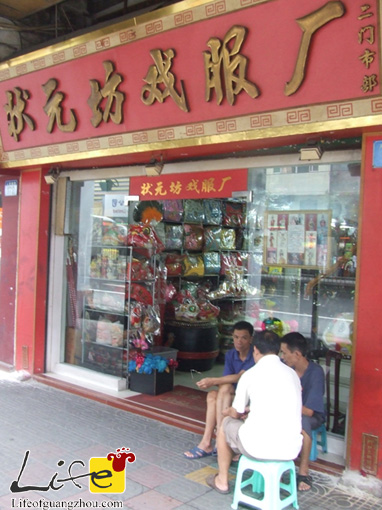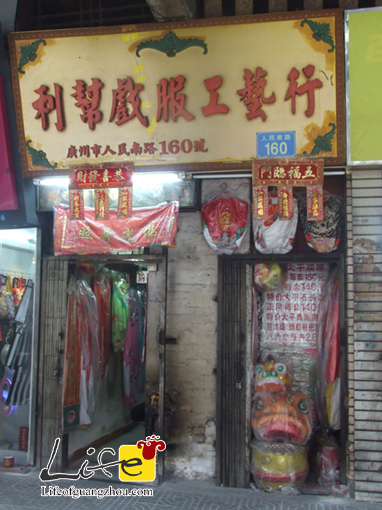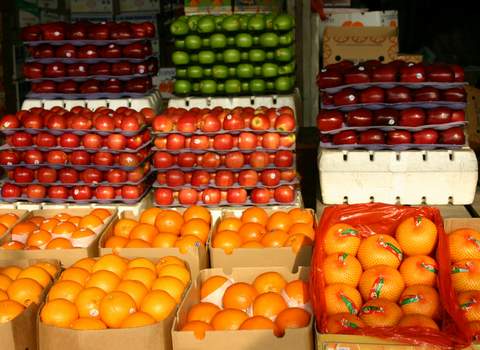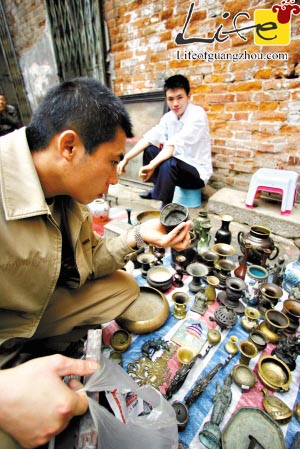Renmin Nan Road
Ever wanted to try on a Chinese emperor's robe? Would you like dress up as a traditional Chinese bride and have your photo taken? Or are you looking for things such as masks, swords and Chinese knots to improve the fengshui of your house?
Then you should pay a visit to Renmin Nan Road in downtown Guangzhou, especailly the short section around Zhuangyuan Fang Alley.
Zhuangyuan Fang Costume Workshop is one of the oldest costume makers in the city. It has been the costume provider for many famous films, dramas and TV series, such as Once Upon a Time in China and America (led by Jet Li and Rosamund Kwan), and Macau Bride.
 |
|
The facade of the Zhuangyuan Fang Costume Workshop in Renmin Nan Road, Guangzhou.
|
The Huitao Costume Co. Ltd. is another place worth visiting. Young though it is, Huitao has become one of the leaders in the costume industry. Connected with local mainstream TV stations such as Guangdong TV and Guangdong Southern TV, it is frequented by local Yue Opera fans, artists and foreign tourists, some of which are avid collectors.
There are a number of other costume providers on Renmin Nan Road, as well, providing both ready-for-sale, machine-made pieces and elaborate hand-made ones too. Made-to-order service is also available in these shops, but you had better avoid the busy season around the Spring Festival.
 |
|
The facade of the Libang Costume Workshop at No. 160 in Renmin Nan Road, Guangzhou.
|
Guangzhou Jiangnan Fruit and Vegetable Wholesale Market

"We can have fresh vegetables from all around China staying in Guangzhou. The locals consume seven million kilograms of vegetables per day," Said Li Jiajian, Vice General Manager of Guangzhou Jiangnan Fruit and Vegetable Wholesale Market. This market tops the annual turnover across China.
"No meat is better than no vegetables." Just like drinking morning tea (having breakfast), Guangzhou people's preparation of vegetables for the dinning table is a habit. More than 70% of vegetables bought in Guangzhou are from the Jiangnan Fruit and Vegetable Wholesale Market.
More and more affluent Cantonese are turning into gourmands. A mushroom wholesale business boss said, "From 5RMB/g common mushrooms, to over 1,000RMB/g top-end mushrooms are both in great demand in Guangzhou markets."
New Zealand Kiwifruit, South America Red Grapes, Thailand Durian… These foreign fruits on Guangzhou people's favorite lists are mostly allocated from this wholesale market to Pearl River Delta and all of China. More than 1,000 tons of vegetables and fruits are imported or exported from here every day.
Add.:No. 926 Zengcha Road, Songzhou Street, Baiyun District, Guangzhou.
Tel.:020-81983988
Yuansheng Xijie Street

There's a small street lying between HuaLin International Jade Trade Center and Guangzhou No.31 Middle School.
With a traditional Chinese memorial arch entrance, the street is full of stalls and booths standing next to each other, selling a wide range of ancient antiques and handicrafts. Here you may find treasures of exquisite workmanship such as: bronze wares, Chinese jades, ceramics, wood carvings, traditional Chinese paintings, calligraphy and red porcelain teapots.
This street is called Yuansheng Xijie Street, an ideal bazaar for ancient antiques.
Yuansheng Jie Street, famous for its porcelains and jades, is encircled by four pathways, namely, Kangwang Lu, Changshou Xi Lu, Wenchang Bei Lu and Longjin Zhong Lu. It rises from Yuansheng Xijie Street.
The hundred-year old business path is like a large magnetic field, attracting experts and merchants from home and overseas to seek for treasures.
Yuansheng Xijie Street has a time-honored history regardless of its unattractive appearance. According to records, Yuansheng Xijjie Street and other nearby streets like Daihe Lu Road (now Kangwang lu) and Changshou Lu have been the processing and distributing centers for jades since the Qing Dynasty.
According to the "Guangzhou Local Chronicles", both land and water transportation had been developing rapidly in Guangzhou since the Ming and Qing Dynasties. Frequent business communication and great convenience in transportation gave a boost to the Jade carving industry in Guangzhou, appealing to elite craftsmen from across the country.
Wealthy merchants lead the collecting trend
The jade handicraft industry in Guangzhou reached its peak between 1929 - 1936. Shengxiang Jade Market on Changshou Lu and Chongde Jade Market on Dai He Road were the 2 giants in the field in south China, having world-wide fame at that time.
Xu Enzheng, director of Guangzhou Local Chronicles Office of Li Wan district, said that before the foundation of the new China, the neighborhood of Yuansheng Xijie Street had always been a cherished heaven for craftsmen from across the country. The shops sometimes did business in jade as well as ancient antiques and wooden furniture. The scale of the trading area was not as big as today, yet it remained one of the major bazaars for ancient antiques in Guangzhou in the past.

Collectors always linger in the market
The trading of jades and curiosities in Yuansheng Xijie Street and Changshou Lu had something to do with the social customs of ancient antique collecting that formed during Qing Dynasty in Xi Guan of Guangzhou.
In the later years of the Qing Dynasty, Xi Guan was heavily inhabited by a group of celebrities, politicians and merchants from high society, who became the first owners of the famous Xiguan houses.
Zhou Yongsheng, a member of the China Ancient Porcelain Academic Association and Deputy-chief of the Chamber for Yuansheng Jie Porcelain and Jade Handcraftsmanship Street, said that the society was immersed in elegant and refined customs at that time. Curio-hunters and sellers remained good friends although they were involved in business relations with each other. Usually, sellers would select antiques in line with customers' interests and preferences.
Old street of curiosities with the new charm
The scale of the Yuansheng Jie porcelain and jade handcraftsmanship Street has been growing steadily since the 1990s, with a lot of shops and firms flourishing in the area. Regardless of the global economic recession at the end of the last century and a downward spiraling of the collecting industry, Yuansheng Jie Street is still developing.
However, problems are beginning to emerge in this 100 year old street as the city develops. As many stalls and booths are taking up the public space of roads for further business, the street is becoming extremely crowded. Shops that were built together with residences pose problems for security management and fire prevention.
In 1996, the government of Li Wan district decided to build a 1-kilometer long "Xi Guan Curio Center", on both sides of Lizhiwan Lu, south of the Pan Xi Restaurant. The center aims at asserting itself as both a trade zone and a tourist spot for business, exhibitions, exchanges and communications for curiosities and sightseeing. Though some shops and firms in Yuansheng Jie Street have been moved to Xi Guan Curios Center, the street remains one of the largest curiosity bazaars in Guangdong, even in China.
Chinese ethnic goods appeal to foreigners
Among all the buyers at the market, foreign treasure-hunters have made a deep impression on Zhou Yongsheng. With blonde hair and blue eyes, many foreigners are often seen lounging around the street. World-wide fame brings many foreign visitors to the street, especially during the Canton Fair.
Foreign bargain hunters are kind of shrewd, said Zhou; some Chinese buyers always show them the best thing first, no matter how expensive it is. Thus the shop usually asks a high price. However, some foreigners state that they don't have much money and that cheap is ok, when they first enter the shop. Therefore in order to make a deal, sellers will offer reasonable prices.
Foreigners may not always like high-class things, but ancient antiques and curiosities with Chinese ethnic features seem never to disappoint them. Once a British engineer spent hundreds of RMB for an old abacus with which he was very satisfied in Zhou's shop. He told Zhu that, there are no such things in Britain; it's amazing to find them here. I will give it to my daughter as a birthday gift.
Business stretching out overseas
There is a famous merchant called Rao Qingjiang, who has been very successful in the porcelain wholesale business in the Yuansheng Jie porcelain and jade handcraftsmanship Street. He has expanded his business to countries like Malaysia, Singapore and Thailand while sustaining a sound business in China's domestic market.
People from the curio circle say that there are 3 basic things that will be required if you are a collector: sharp eyes, inner quality and being resolute. Sharp eyes come first; it is of great importance for distinguishing real from fake and good from bad. Words can not describe the joy when finding a curiosity of real value.